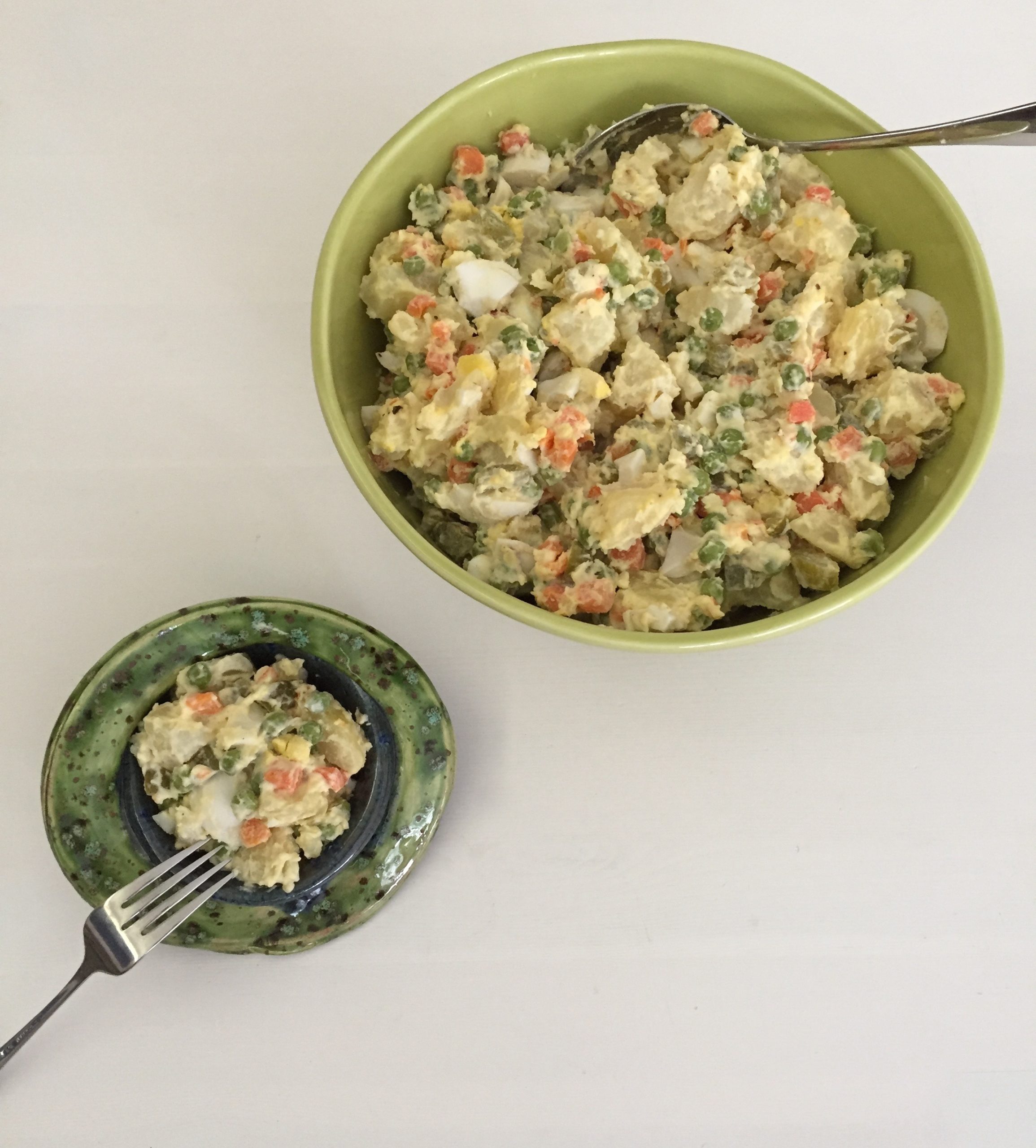When I was a young girl, back in the 70’s, one of the beloved opening courses served in weddings, parties, and big events, was a potato salad known in Israel by the name ‘Mayonnaise Salad’. It was the only potato salad I even heard of at that time, and it included eggs, peas, carrots, and pickles. This was an iconic dish in Israeli culture for 3-4 decades. Not anymore, unfortunately. It’s not cool or sophisticated enough for today’s culinary scene. You can still find it in supermarkets and delis, and best of all, people still love to make it at home (I certainly make it), and bring it to picnics, but you won’t be able to associate it with weddings and big events anymore.

I was very surprised to recently find a very similar version to my beloved potato salad in a local Brazilian eatery, here in South Florida. At first, my reaction was of disbelief; how can this so Israeli dish get to a Brazilian eatery in South Florida where 90% of the people who eat here are Brazilian immigrants? Then, it occurred to me that maybe this very Israeli dish was not so Israeli as I thought. Maybe it was brought to Israel with one of the many immigrant groups who came to Israel in the last two centuries. Hmmm!
I’ve decided to conduct a small research on the Internet and bingo! The potato salad I had at the Brazilian eatery is known all over Latin America as ‘Russian potato salad’. So I looked up Russian recipes of potato salad, and I found it! In Russia it’s known as ‘Olivier Salad’. It is served on special occasions such as New Year’s Eve, Christmas, weddings, and other big events. Rings a bell?
During the 19th and 20th centuries there were a few big waves of immigration of Jews from Russia (aka USSR) to Israel. With such a great reputation going for this Olivier salad, it seems only natural that it ended up with the immigrants in their new home. The ingredients in both Russian and Israeli versions are exactly the same, except for ham, that was one of the ingredients in the original Russian version and got omitted from the Israeli version, probably for kosher reasons. Like many other dishes brought to Israel by immigrants from all over the world, this potato salad assimilated very well in Israel. It got a new Israeli name, made it into every kitchen in the country, and became so much part of the culture, that nobody really knows that its roots are Russian. But does it really matter?
Ingredients:
4 large Yukon or Russet potatoes, rinsed
5 large eggs, rinsed
3 medium carrots, diced*
2 cups frozen peas *
3 dill pickles, diced
1- 1 ½ cups mayonnaise
salt and pepper to taste
* You may use a bag of frozen peas & carrots mix, instead of the two separate ingredients above
Preparation:
In a large pot, combine the rinsed potatoes and eggs. Cover with water, bring to a boil, and simmer until potatoes are soft when pierced with a knife. Discard of the water and let the potatoes and eggs get to room temperature before peeling them.
In a medium pot, combine the diced carrots and peas. Cover with water, bring to a boil, and simmer until carrots are soft, about 4-5 minutes. Discard of the water and let cool off in a strainer, to remove all liquid.
Cut the peeled potatoes and eggs into ½ inch cubes and place in a large bowl.
Add peas and carrots, pickles, 1 cup of mayo, salt and pepper, and mix well until all ingredients are well incorporated. If desired, add the rest of the mayo.
This salad is best when fresh, but is also good refrigerated and eaten within a week.

